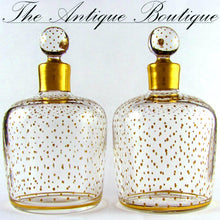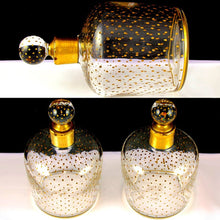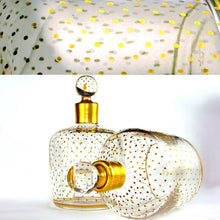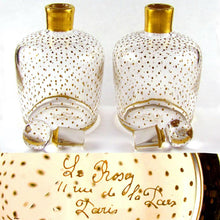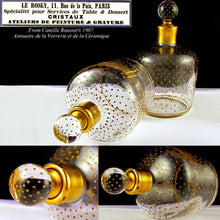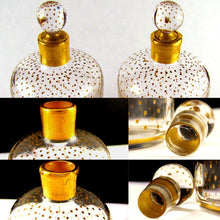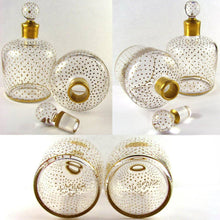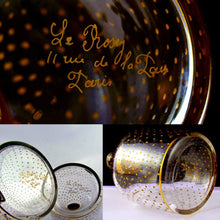
A fine pair of 19th century French perfume or scent bottles, retailed by Le Rosey in Paris. The stoppered bottles of exquisite quality crystal, etched or engraved throughout with petite dots applied with gilt gold accents. These gorgeous bottles feature gilt painted collars, rounded knob stoppers. The necks and stoppers are marked (engraved) with a corresponding number to indicate matching pieces, a typical feature found on quality items typical of renown cristalleries, such as Baccarat and St. Louis. Having a polished pontil to the base, marked for Le Rosey 11 rue de la Paix in Paris. The Le Rosey firm had a long and interesting history, producing quality crystal and porcelains for the Duke of Orleans.
Louis Marie Francois Rihouet (Rihouët) was born in 1791 into a wealthy family attached to the Duke of Orleans. In 1818, Rihouët begin his porcelain and glass retailing business located at rue de l'Arbre Sec, producing exquisite pottery and porcelain painted in the manner of Sevres, most of which are quite valuable today. His patrons included the king and some of his court as well as the duc d'Orléans. In 1824 he obtained the title of faïencier du Roi, (fournisseur du roi). It was at that time he moved his business to the prestigious address of 7 rue de la Paix, this great shopping district was and still is home to some renown boutiques and workshops, including Tahan, Cartiers and Aucoc (located at 6 rue de La Paix) they were the 'Tiffany's' of France as they were the jewelers and silver supplier to the house of King Louis Philippe. Rihouët retired from business in 1853 and sold his business to Charles Lerosey which continued under the brand Rihouet Lerosey (Rihouet et Lerosey). The firm was also known to mark their wares with Rihouet, Le Rosey et Jacquel, as they often employed the services of Jacquel who had a decorator's studio at 3 rue de la Paix in 1856 and was known to paint in the style of Sevres and was a 'fournisseur' de King Louis-Philippe. The business moved to 11 rue de la Paix and went under the name of Monsieur Le Rosey à Paris, according to the report of the délegation ouvrieré exposition of 1867. The Le Rosey firm was taken over sometime around 1910 by the Haraud-Guignard (Maison Toy), who continued to signed their wares with Le Rosey and HG.
François-Eugène Rousseau (1827-1890) succeeded both his father and grandfather when he inherited the family retail shop in 1855, located at 41 rue Conquilere in Paris. Respected among the art glass profession of his day, Rousseau's firm retailed and produced outstanding art glass and ceramics. He worked with such renown glassmakers as Appert Freres. Rousseau's early vessels were executed entirely by Appert Freres, consulting them on technical matters even when he opened his own glass-making studio, indeed as did other glass houses, including Emile Galle and Daum Freres. Rousseau hired Ernest Baptiste Léveillé (1841-1913) in 1877 to join in as decorator. In 1885 he sold his workshop to his former pupil and assistant Ernest-Baptiste Léveillé. Léveillé continued to produce glassware in the much-admired designs and techniques of Rousseau and offered in his shop, among other things, glasses by Emile Gallé. Most of Rousseau's vases were unsigned, but some that were in stock were signed at Leveille's instigation. Rousseau stayed on until 1888 when his health forced him to retire. Leveille changed the name of the business to Rousseau & Leveille Reunis and moved to 74 Boulevard Haussmann. He continued to use Rousseau's techniques in his own works, though more inspired by the Art Nouveau. At the World Exhibition 1900, he advertised bowls and vases made of colorless glass, etched glass and cut glass, drinking sets, and gold, silver or other metal mounted glass products. Leveille merged with Maison Toy after 1900, which had a prestigious address at 10 rue de la Paix, marking his wares with Toy & Leveille, but by the beginning of the 20th century, he was forced to sell the business to Haraud and Guignard, the owners of Le Rosey. Haraud-Guignard continued to produce existing Leveille designs for some years, signing them with either the initials HG or Le Rosey.
Louis Marie Francois Rihouet (Rihouët) was born in 1791 into a wealthy family attached to the Duke of Orleans. In 1818, Rihouët begin his porcelain and glass retailing business located at rue de l'Arbre Sec, producing exquisite pottery and porcelain painted in the manner of Sevres, most of which are quite valuable today. His patrons included the king and some of his court as well as the duc d'Orléans. In 1824 he obtained the title of faïencier du Roi, (fournisseur du roi). It was at that time he moved his business to the prestigious address of 7 rue de la Paix, this great shopping district was and still is home to some renown boutiques and workshops, including Tahan, Cartiers and Aucoc (located at 6 rue de La Paix) they were the 'Tiffany's' of France as they were the jewelers and silver supplier to the house of King Louis Philippe. Rihouët retired from business in 1853 and sold his business to Charles Lerosey which continued under the brand Rihouet Lerosey (Rihouet et Lerosey). The firm was also known to mark their wares with Rihouet, Le Rosey et Jacquel, as they often employed the services of Jacquel who had a decorator's studio at 3 rue de la Paix in 1856 and was known to paint in the style of Sevres and was a 'fournisseur' de King Louis-Philippe. The business moved to 11 rue de la Paix and went under the name of Monsieur Le Rosey à Paris, according to the report of the délegation ouvrieré exposition of 1867. The Le Rosey firm was taken over sometime around 1910 by the Haraud-Guignard (Maison Toy), who continued to signed their wares with Le Rosey and HG.
François-Eugène Rousseau (1827-1890) succeeded both his father and grandfather when he inherited the family retail shop in 1855, located at 41 rue Conquilere in Paris. Respected among the art glass profession of his day, Rousseau's firm retailed and produced outstanding art glass and ceramics. He worked with such renown glassmakers as Appert Freres. Rousseau's early vessels were executed entirely by Appert Freres, consulting them on technical matters even when he opened his own glass-making studio, indeed as did other glass houses, including Emile Galle and Daum Freres. Rousseau hired Ernest Baptiste Léveillé (1841-1913) in 1877 to join in as decorator. In 1885 he sold his workshop to his former pupil and assistant Ernest-Baptiste Léveillé. Léveillé continued to produce glassware in the much-admired designs and techniques of Rousseau and offered in his shop, among other things, glasses by Emile Gallé. Most of Rousseau's vases were unsigned, but some that were in stock were signed at Leveille's instigation. Rousseau stayed on until 1888 when his health forced him to retire. Leveille changed the name of the business to Rousseau & Leveille Reunis and moved to 74 Boulevard Haussmann. He continued to use Rousseau's techniques in his own works, though more inspired by the Art Nouveau. At the World Exhibition 1900, he advertised bowls and vases made of colorless glass, etched glass and cut glass, drinking sets, and gold, silver or other metal mounted glass products. Leveille merged with Maison Toy after 1900, which had a prestigious address at 10 rue de la Paix, marking his wares with Toy & Leveille, but by the beginning of the 20th century, he was forced to sell the business to Haraud and Guignard, the owners of Le Rosey. Haraud-Guignard continued to produce existing Leveille designs for some years, signing them with either the initials HG or Le Rosey.







